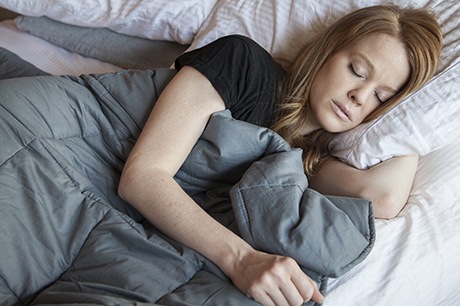Can weighted blankets help with anxiety?
Weight blanket benefits go way beyond a good night’s sleep. As calming as a full body hug, they take snuggling to a whole new level.
Weighted blankets come in many sizes and materials. What makes them different is they’re filled with plastic pellets to make them heavier. Some only add a few extra pounds and are suitable for children over age 3. Some add as much as 30 pounds and are designed for adults — a good rule of thumb when you’re looking for a weighted blanket is to find one that weighs about 10% of your body weight. More than that can be uncomfortable.
Feeling anxious? You’re not alone.
Everyone feels stress from time to time. And with stress comes anxiety. Your heartbeat accelerates. Your breathing becomes shallow. Your body releases adrenalin and cortisol to help you deal with the perceived danger. It’s all part of the flight, flight or freeze response that served our ancestors well when they were dealing with predators on a daily basis.
Luckily, we’re seldom chased by saber-toothed tigers. But we still have plenty to worry about. And since our dangers are harder to define, it’s hard to know when it’s okay to stop worrying. That’s why in the modern world, anxiety often becomes chronic — and it takes a toll on your health.
How do weighted blankets work?
Weighted blankets work by activating your parasympathetic nervous system, lowering your heart rate while creating the sensation of deep pressure touch (DPT), an approach used by occupational therapists to relax hyperactive children and calm adults that includes hand holding, hugging and swaddling.
DPT has been used to help people with anxiety by:
- Minimizing repetitive behaviors
- Lowering impulsive behaviors
- Increasing attention and focus
- Improving fine motor skills
- Boosting oxytocin levels
People with chronic anxiety may also have depression, pain and fatigue — all side effects that can be soothed by DPT.
“Weighted blankets give you the sensation of being swaddled or held closely like a baby in its mother’s arms,” explains Lynne Gallagher, LCSW, clinical psychiatry specialist at Geisinger. “Maybe that’s why many people find they help them sleep like babies, too. But if you’re having trouble sleeping or still feeling anxious after using a weighted blanket, ask your doctor to help you find a better solution.”
Weighted blankets aren’t for everyone.
Weighted blankets aren’t recommended for very young children or for adults who are too frail to lift them off their bodies. Anyone with claustrophobia, sleep apnea, asthma or very low blood pressure should check with their doctor before trying them. And if you have a pet who likes to snuggle under the covers with you, think twice about getting a weighted blanket — that 10% of body weight applies to them, too.
Next steps:
See how Geisinger made better health easier for these patients
Considering taking a sleep aid? Read this first
Learn more about anxiety





